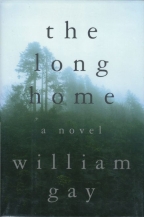The Long Home
William Gay
MacMurray & Beck Fiction
US Hardcover First
ISBN 1-878448-91-9
Publication Date: 11-01-1999
257 Pages; $24.95
Date Reviewed: 10-09-02
Reviewed by Rick Kleffel © 2002

REFERENCES
COLUMNS
|
|
|
The Long HomeWilliam GayMacMurray & Beck FictionUS Hardcover FirstISBN 1-878448-91-9Publication Date: 11-01-1999257 Pages; $24.95Date Reviewed: 10-09-02Reviewed by Rick Kleffel © 2002 |
|
|
REFERENCES |
COLUMNS |
The Devil likes it in the south. He's made a number of memorable appearances. Readers can add 'The Long Home' to the novels written about the Devil in the demure tradition of the Southern Gothic. William Gay scratches the surfaces until they bleed, his ultra-low key prose eking its living in the hardscrabble, almost lunar landscape. Don't expect a lot of overt supernatural horror here. Instead, look for the languid pace and drugged feel of Cormac Macarthy or William Faulker. This is the south as it might be seen by one of the more hard-headed inhabitants of an H. P. Lovecraft story. There's a deep evil buried in the landscape that seeps slowly up into the people who walk over it. It may be that the evil seeps down from the people. Nobody knows, lots die, blood flows.
The weight of having lived too hard too long hangs over the novel from the first page. It's 1933 and Thomas Hovington is walking across his yard when the earth splits and spits out brimstone. Soon after, Dallas Hardin shows up. Hardin is made of sterner stuff than most humans. Soon Hovington is confined to his bed by illness and Hardin has moved into his house, taken his wife, and is eying Hovington's daughter Amber Rose with ill intent. Nathan Winer tries to put an end to Hardin's residence, but is killed and shoved down the crack in the earth. Ten years later, his now seventeen year old son, also named Nathan, is looking for work. William Tell Oliver, a neighbor who never did more than watch Hardin's ill influence spread like rot, decides to do what he can to help young Nathan. And Hardin just grows denser, darker, harder.
Gay writes in the slow drawl of his predecessors and takes a page or two from Flannery O'Connor in rendering bullet-hard sudden violence. A lot of blood is shed on brick-hard ground that seems eager to drink it up. Beneath the ground there's a haze of violence and evil that evaporates into the very atmosphere, poisoning the characters and their lives. Gay's prose is often quite beautiful as well. It's stern beauty, stark like the rocky quarries dotted with dead pines.
Gay has a very deft hand with his characters. Nathan Winer is the bursting fountain of adolescence, clumsy and unschooled. William Tell Oliver is a wonderfully wistful old man, whose regrets will reach into the reader's heart and wrench it around. Motormouth Hodges provides true comic relief as the town drunk. Were it not for Gay's visceral vice grip on some sediment that connects these characters, they might land with a thud. Instead, each is a true power. Dallas Hardin is a fascinating incarnation of evil. Gay constantly and expertly skirts the edge of overt supernaturalism. He pushes his characters and prose so hard that a light shines up through them from beneath the landscape.
A novel like 'The Long Home' is clearly not for all people. The combination of ugly violence, the thrumming boredom of ignorance, the biblical sense of good versus evil and the raw face of American poverty aren't your usual treasure map to a fun-filled reading experience. Gay does leaven his manuscript with humor, but not enough to undercut the power of his vision. If you'd like to hear a memorable tale told by one of the rural hermits of an H. P. Lovecraft landscape with the finesse of Faulkner or McCarthy, then the powerful prose and fine writing of 'The Long Home' will certainly prove to be its own reward. And it will render the punishments with a breathtaking precision.